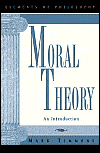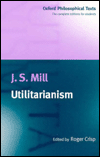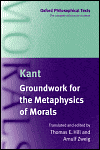Syllabus for Ethics
PHIL 314 - Ethics
Dr. Keith Korcz - Fall 2006
How To Reach Professor Korcz:
My office is in H. L. Griffin Hall, rm. 563. My office hours are MW 12:00-1:30 and 3:00-4:00,TR 12:00-2:30, and F 12:00-12:30. We can also meet at other times by arrangement - just ask. My office phone no. is 482-6806. You can also contact me (or ask questions) by e-mail at keithk@louisiana.edu.Required Texts:
2. John Stuart Mill, Utilitarianism, ed. by Roger Crisp, (New York, NY: Oxford University Press, 1998).
3. Immanuel Kant, Groundwork for the Metaphysics of Morals, ed. by Thomas E. Hill, Jr. and Arnulf Zweig (New York, NY: Oxford University Press, 2002).
4. Course Pack (available only at the Dupre Library Reserve Room).
Assignments & Grading:
There will be two exams during the semester, each worth 20% of your course grade, a cumulative final exam worth 25% of your course grade, and a paper done in successive drafts, the first draft being worth 10% of your course grade and the final draft being worth 25% of your course grade. The in-class exams will consist primarily of short answer and multiple choice questions. However, all make-up exams will be primarily long-essay. The exams will cover both lectures and assigned readings (material in lectures and assigned readings will not always overlap). All exams are closed book/closed note. The paper must be at least 8 - 10 pages in length, and will be described in more detail on a separate handout.
The course grades will initially be determined according to the standard scale, i.e., 90-100% = A, 80-89% = B, 70-79% = C, 60-69% = D, 59% and below = F, and then may be modified as follows: Course grades might be curved, but, if so, the curve would not be such that any student's grade is lowered. Such factors as improvement over the length of the course, class participation, attendance, etc., may be taken into consideration, especially where doing so may improve a borderline grade. You must complete all course assignments (namely all exams and both drafts of the paper) to receive a passing grade (i.e., a grade other than F, NC or U).
Internet Resources:
I strongly recommend taking advantage of the following resources!
The home page for this class contains links to an on-line syllabus (which contains numerous links to home pages of authors we'll be reading, readings available on-line, etc.), and links other resources you will find helpful. The web address is: http://www.ucs.louisiana.edu/~kak7409/314Home.html.
My How To Survive Your First Philosophy Course pages contain useful information about what I look for when grading papers, how to study for my exams, reading philosophy, taking notes, doing research in philosophy, etc. The web address is: http://www.ucs.louisiana.edu/~kak7409/Survival.html.
My home page contains links to all my course home pages, extensive links pages on philosophy, general research, fun sites, and lots of other information. The web address is: http://www.ucs.louisiana.edu/~kak7409.
Class Policies:
If you miss class, for whatever reason, it is your responsibility to get class notes from another student. If you miss an assignment due date, you must notify me within one week of either the due date of the assignment or the cessation of a medically documented persistent vegetative state in order to make up the assignment. Missed exams or other assignments can be made up for full credit only if an appropriate excuse, e.g., illness requiring medical attention, participation in certain official university events, etc., is provided. An unexcused late assignment will be dropped 2/3 of a letter grade per day it is late. If you have a disability and require assistance with fulfilling class assignments, don't hesitate to notify the instructor and the Office for Services to Students with Disabilities at 482-5252. Finally, be sure you are familiar with all university policies described in the UL Undergraduate Bulletin. All assignments for this class must be completed individually (i.e., without the help of anyone except the instructor), and any instance of academic dishonesty on any assignment will be sufficient to fail the course.
Emergency Evacuation Procedures:
A map of this floor is posted near the elevator marking the evacuation route and the Designated Rescue Area. This is an area where emergency service personnel will go first to look for individuals who need assistance in exiting the building. Students who may need assistance should identify themselves to the teaching faculty.
Course Calendar & Planned Reading Assignments*
You should complete each of the readings before they are discussed in class. Some of the readings are difficult, and you may find that you need to re-read them after they have been gone over in class in order to fully understand them.*NOTE: All planned topics, readings and assignments are tentative and may be altered or deleted.
(MT) = Moral Theory, by Mark Timmons
(CP) = Course Pack
(U) = Utilitarianism, ed. by Roger Crisp
(G) = Groundwork for the Metaphysics of Morals, ed. by Hill and Zweig
I. Essentials of Ethics (Week of Aug. 21)
(on course home page): "What Is Philosophy?" and "Moral Reasoning In Applied Ethics" by Keith Korcz; (MT) Chapter 1, "An Introduction to Moral Theory."
Monday, September 4 - Labor Day - No Classes
II. Normative Ethical Theories
A. Ethical Relativism (Week of Aug. 28)
(MT) Chapter Three, "Moral Relativism"; (CP) "Where Do Moral Standards Come From?" by Russ Shafer-Landau.B. Ethical Egoism
(CP) "Egoism" by Tom Beauchamp.C. The Divine Command Theory (Sept. 6)
(MT) Chapter Two, "The Divine Command Theory."D. Meta-Ethical Theories of Value (Week of Sept. 11)
(CP): "Well-Being" by Shelly Kagan; "The Experience Machine" by Robert Nozick.E. The Natural Law Theory
(MT) Chapter Four, "Natural Law Theory."
FIRST EXAM: WEDNESDAY, SEPTEMBER 20
F. Classical Utilitarianism (Weeks of Sept. 25 and Oct. 2)
(MT): Chapter Five, "Classical Utilitarianism", p. 103-121 only; (U): "Editor's Introduction" and "Utilitarianism" by John Stuart Mill.
Thursday & Friday, Oct. 5-6 - Fall Holiday - No Classes
G. Contemporary Utilitarianism (Weeks of Oct. 9 and Oct. 16)
(MT): Chapter Five, "Classical Utilitarianism", p. 121-129 only; Chapter Six, "Contemporary Utilitarianism"; (CP) "Against Ordinary Morality" by Shelly Kagan, "Negative Responsibility and Two Examples" by Bernard Williams; "Alienation, Consequentialism and the Demands of Morality" by Peter Railton and "The Scalar Approach to Utilitarianism" by Alastair Norcross.
SECOND EXAM: WEDNESDAY, OCTOBER 18
H. Kantianism (Weeks of Oct. 23 and Oct. 30)
(MT) Chapter Seven, "Kant's Moral Theory."
FIRST DRAFT OF PAPER DUE: WEDNESDAY, NOVEMBER 1
I. Moral Rights (Week of Nov. 6)
(CP) "The Nature and Value of Rights" by Joel Feinberg; "Are There Any Moral Or Human Rights?" by Alan Gewirth; selections from A Theory of Justice: Revised Edition by John Rawls.
J. Ross' Theory (Week of Nov. 13)
(MT) Chapter Eight, "Moral Pluralism"; (CP) "What Makes Right Acts Right?" by W. D. Ross.
K. Utilitarianism, Rights and The Trolley Problem
(CP) "Rights, Goals and Fairness" by T. M. Scanlon; "The Trolley Problem" by Judith Jarvis Thomson.
L. Virtue Ethics (Week of Nov. 20)
(MT) Chapter Nine, "Virtue Ethics"; (CP) "Should We Do What Buffy Would Do?" by Jason Kawal.
III. Some Meta-Ethical Issues
A. Moral Realism (Week of Nov. 27)
(CP) "Moral Realism and Moral Inquiry" by David Brink.
FINAL DRAFT OF PAPER DUE: WEDNESDAY, NOV. 22
B. Why Be Moral?
(CP) "Morality and Advantage" by David Gauthier.
Thursday And Friday, November 23-24: Thanksgiving Holiday, No Classes.
LAST DAY OF CLASSES: FRIDAY, DECEMBER 1
STUDY DAY: WEDNESDAY, DECEMBER 6
FINAL EXAM: FRIDAY, DEC. 8, FROM 10:15 AM - 12:45 PM, IN REGULAR CLASSROOM
Some Helpful Tips:
1. On class evaluations, students often state that they would tell friends planning to take this class that good class attendance and good class notes are essential to doing well on the exams.
2. Keep up with the readings - they further explain and help you to remember the issues you'll be tested on.
3. If you're having trouble understanding course material, do not hesitate to discuss it with the instructor!


